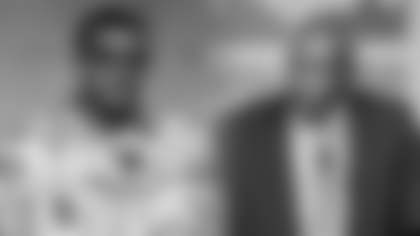ENGLEWOOD, Colo. — When Floyd Little first met John Beake, they were both rivals and teammates.
In January of 1969, Little arrived in Jacksonville, Florida, for his first AFL All-Star Game. His 1968 season had been a tour de force; he led the AFL with 1,825 all-purpose yards and proved to be one of pro football's most dangerous players whenever he had the ball in his hands.
Coaching him in that game, though, would be the staff from the Kansas City Chiefs, one of the Broncos' hated rivals. The Broncos had been no match for Kansas City in Little's first two years in the league, but the young running back's talent had been evident nonetheless. And now, the Chiefs would get to see him on their own team, in a way, as part of the West Team in the All-Star Game. Beake, coming off his first season coaching for the Chiefs, would be his position coach.
Unbeknownst to both of them, it would be the start of a lifelong friendship.
"I was the youngest coach around and I had these great running backs," Beake recalled recently. "And Floyd had a wonderful personality. He and I got along great. His running style, he knew what he was doing. He had good vision and he had good quickness, which we all know is important. And when you're at an all-star game, you kind have a watered-down offense and defense, and so it was fun to coach him. He really got in there and was very serious."
The two bonded quickly, as the two both had military schooling in their background — Little as a former student at Bordentown Military Academy and Beake as a former coach at New York Military Academy.
The game itself was memorable, too. The West Team overcame a 25-13 fourth-quarter deficit by scoring 25 points in a little over six minutes. Little did his part to spark the comeback with an 81-yard catch-and-run that set up the first touchdown of the 25-0 run.
After the game, they went their separate ways — Little returning to Denver and Beake going back to Kansas City. But knowing each other as they did, they always made sure to say hello when their paths crossed in the two divisional games played each year.
"We always would see each other, go over and [I'd] give him a handshake or a big hug," Beake says, "because we stayed very close all those years."
After the 1975 season, Little called it a career. Yet, the two would be able to stay in contact much more when the former Chiefs coach joined Denver's front office in 1978.
Beake would go on to have a memorable career in Denver, helping shape the team's Super Bowl XXXII and XXXIII teams as general manager. Another part of his job, though, was to help select the most outstanding former Broncos as a member of the Ring of Fame committee, which was founded in 1984.
Little, of course, was a member of the inaugural three-man class.
"At the time, he was in the top echelon of running backs," Beake says. "… He was so good at what he did for the Denver Broncos. He meant a lot to the city of Denver. They were excited about Floyd Little. … He took them to a whole new level."
It wasn't just Little's skill on the football field that wowed Beake, though. It was also his character and the way he could make everyone feel like the biggest person in the room.
"The fans loved him, the business people loved him," Beake says. "He always had time for somebody."
In time, distance grew between Beake and Little; the former running back would move to Seattle at one point, and Beake eventually moved to New York when he got a new job in the league's football operations department. They kept in touch from time to time, but mostly they only saw one another in person again when the Broncos held their annual Ring of Fame weekends.
"It was really special," Beake says. "Every year we got to see each other because of coming back for the Ring of Fame. Pat Bowlen was wonderful with not only having the Ring of Fame but having the big banquet and also having the plaza outside for the Ring of Famers. Floyd would come and he would spot me; he'd come running over like I was his long-lost friend."















